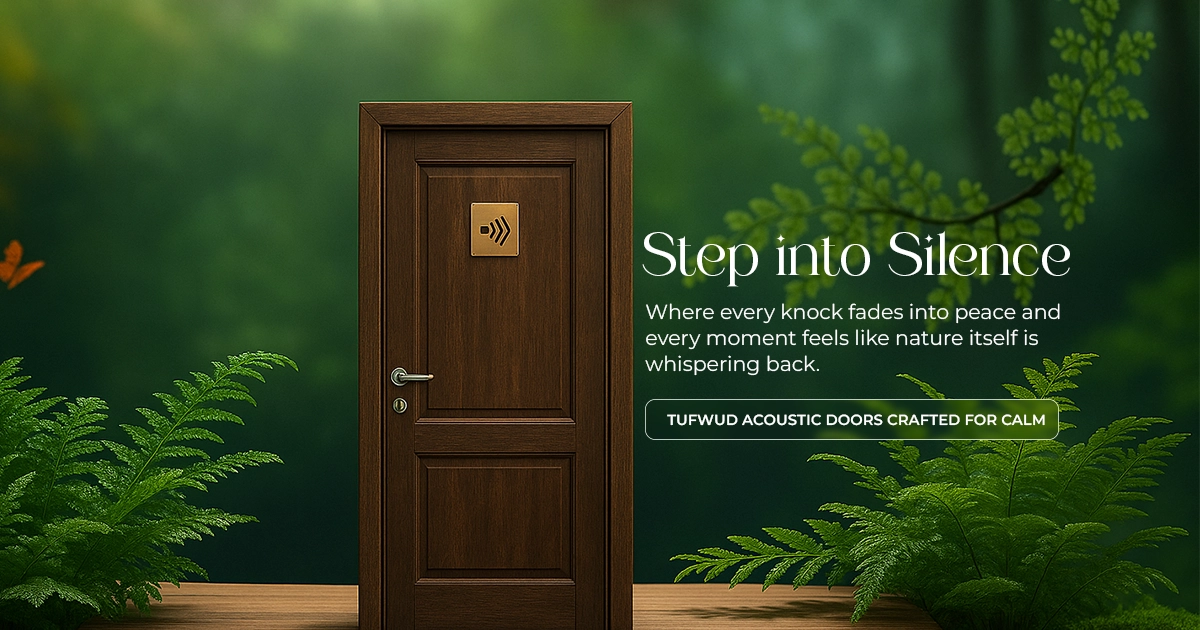Every morning you enjoy your breakfast with your family, but the constant honking and street noise made it impossible to relax. That’s when you start wondering how to reduce noise from outside your home and create a peaceful environment.
Then you decided to make a change — adding soundproof doors and better window seals.
Noise reduce isn’t just about comfort—it’s about creating calm in the middle of chaos.
Why has Noise Pollution become a way of life in Modern Times?
Industrialization
As cities’ factories, machines, and buildings expand, heavy construction equipment, compressors, and grinders produce continuous noise. making it essential to learn how to reduce noise from outside.
Transportation
Since transportation is a constant in cities, cars, buses, trains, and airplanes are the main causes of noise pollution in modern life.
Increased Machinery
The extensive use of power drills and blenders, among other household tools and appliances, raises noise levels in homes and communities.
What is the Meaning of Soundproof?
It refers to insulating a room from noise in order how to Reduce Noise from Outside through a barrier. This can be accomplished by isolating, reflecting, or absorbing sound waves using particular materials and methods.
Benefits of Soundproof Door
Decreased noise pollution: They are utilized in offices and residences How to Reduce Noise from Outside from busy streets or other spaces.
Increased privacy: Soundproof doors keep noise from escaping a space, which is advantageous for media rooms or soundproof door for home offices.
Increased comfort and productivity: They make spaces calmer and quieter so people can work, study, or sleep better.
How does soundproof work?
A large portion of a sound wave’s energy is obstructed when it strikes a strong, solid door. In addition to having a door sweep at the bottom and seals around the frame to remove air gaps that allow sound to escape, it is made with a hefty, dense core to reduce noise from outside.
How to Stop Sound Coming From Outside?
10 Fast & Easy Tips for Blocking Noise Outside
Gaps in the seal: Since windows and doors are frequent places for sound to enter a building, cover the gaps around them with weatherstripping and acoustic caulk.
Employ sound-absorbing blankets: Reduce Noise from Outside, drape sound-absorbing blankets over windows or walls.
Add Thick drapes: To absorb sound waves before they enter the room, hang heavy, sound-deadening drapes.
Add a door sweep: To close the gap, lay a rolled-up towel or install a rubber door sweep at the bottom of doors.
Rugs and carpets: To stop sound from echoing, cover hard floors with carpets or rugs.
Acoustic Panels: In a variety of settings, acoustic absorbers are employed to manage and minimize noise. They are available in a wide range of shapes, sizes, and colors.
Wall coverings: Use tapestries, Cotton quilts, or other heavy fabrics on walls for blocking outside noise.
Soundproof Glass Window: Typically, soundproof glass is hardened and tempered. This glass is stronger. This standard glass reduce outside noice.
Plant Trees: Trees reduce noise by masking, refraction, absorption, and distraction. Certain tree parts, including branches, stems, and leaves, can absorb sound waves.
Ceiling Tiles: Lightweight, drop-in acoustic ceiling tiles are intended to improve sound quality by decreasing noise transfer and lowering echoes.
How Much does Soundproofing Door Cost?
Wooden Acoustic Door: Explore Wooden acoustic door manufacturer company and talk to their experts, know about their product then use it at your modern space for reduce outside noise.
Choose Interior doors for soundproofing: There are different types of interior doors for soundproofing offers different price according to their material. Contact with them for getting budget Interior doors.
3D Soundproof doors: For recording studios, workplaces, band rooms, hotels, dorm rooms, conference rooms, or any other use, 3D soundproof doors are perfect. Contact 3D soundproof doors supplier for budget 3D soundproof door.
How Long does Soundproofing Take?
Depending on the size, materials, and work required, soundproofing can take anything from a few hours for a simple fix to days or even months for a full-room operation.
It can take about days to build a new wall structure with air gaps and dense materials. For full room soundproofing like walls, floors, and ceilings can take upto several days.
It takes a lot less time to soundproof a single wall than an entire room or house.
Which doors are most soundproof?
Solid wood doors are better at stopping sound. A solid wood door will nevertheless allow noise to enter if the door frame is not acoustically treated.
For homeowners asking how to reduce noise from outside, solid wood doors provide excellent results with added beauty.
4 benefits of Solid Wood Doors Core
Durability
Solid wood doors are incredibly resilient and, with the right maintenance, may survive for decades. Compared to other door kinds, they are sturdy and resistant to warping and cracking because of their solid, single-piece structure.
Soundproofing
The ability of solid wood doors to lower noise is among their most important advantages. These doors serve as natural sound barriers because of the density of solid wood, which reduce noise from outside and promotes calm in your house.
Aesthetics
With their distinctive grain patterns, deep textures, and inherent variances, solid wood doors provide unparalleled beauty. They are a classic option that goes well with both traditional and modern home designs since they lend a sense of refinement and elegance to any space.
Customization
From finishes to size, solid wood doors can be customized for both function and beauty—offering an ideal solution for anyone exploring how to reduce noise from outside effectively.
You can create a peaceful haven in your house by selecting the appropriate materials, doors, and insulation methods. Consider that reducing outside noise is a lifestyle decision for peace, comfort, and concentration rather than simply a question.
Contact Us Today for Soundproof Door +91 84200 50754



